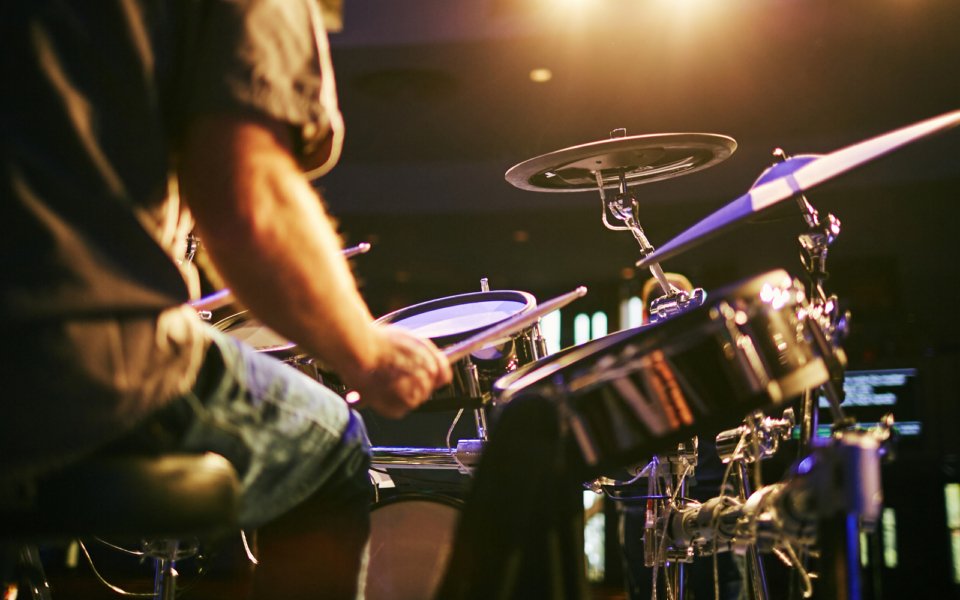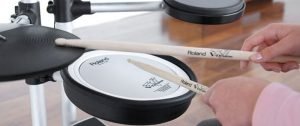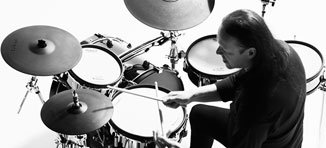Learning to drum may be one of the best and most valuable things you can do to improve as a musician. Every muso, no matter what instrument or style they play can benefit from a deeper understanding of rhythm & groove. Learning to drum may be the most effective way to get you there.
Musical benefits of learning to drum
First, let’s get the obvious out of the way. Learning to drum will absolutely have a huge impact on your skills of rhythm and timing. Although this certainly isn’t the only reason to pick up the sticks, it’s the most appealing benefit for many. Having strong rhythmic skills and a steady “internal clock” are transferable across every instrument. This means you’ll be able to take the things you learn on the kit back to the guitar, keys or whatever your home instrument is.
Bringing strong rhythmic skills to other instruments is invaluable not only for yourself, but also for the cohesion of any group you’re playing with. After all, rhythm isn’t just on the drummer, it’s a responsibility that all musicians share evenly.
Developing musicianship
Arguably the most valuable thing you can gain from learning to drum is developing musicianship. Simply put, musicianship is overall musical skill and ability. It’s something that transcends skills on a single instrument. This is potentially the biggest reason why every musician should learn to play drums. Consider a guitarist who can play dazzlingly fast solos, but not simple chords. They may be a great soloist, but not a great musician. I’m sure you could think of countless other examples. How about a drummer who has excellent timing, but no clue when it comes to the tone and tuning of their drums? Again, a great player, but maybe not a great musician in a broader sense.
In the pocket
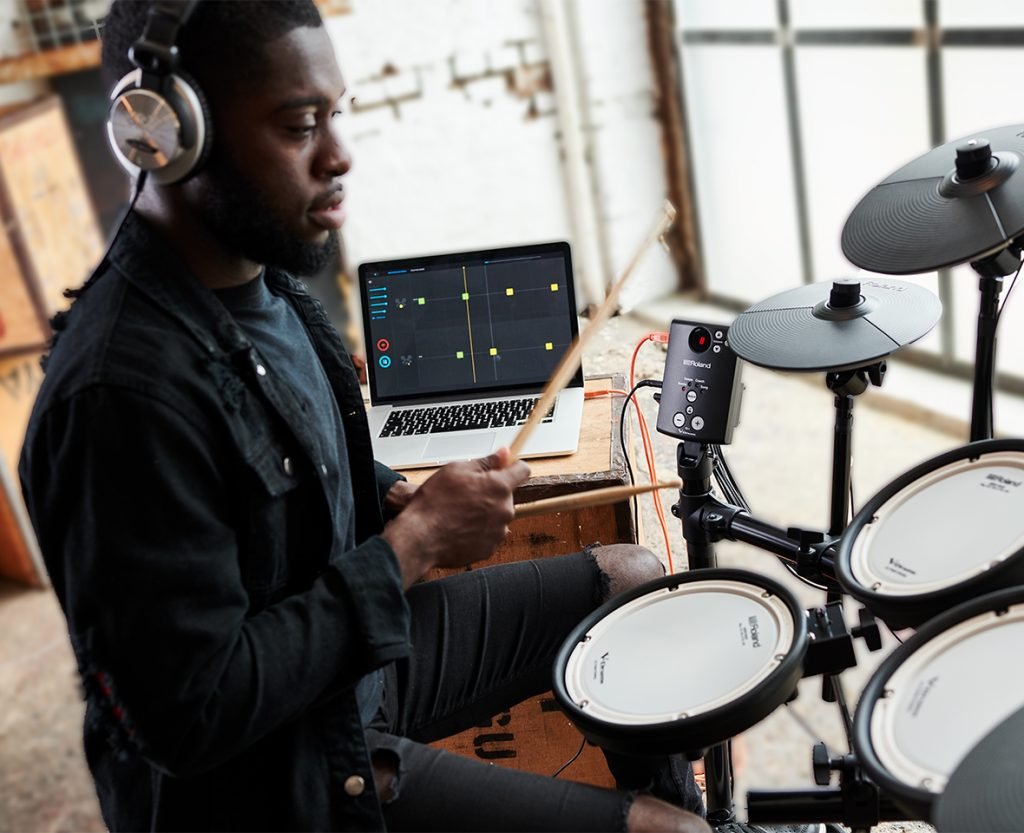
Taking the time to learn to drum will give you a better understanding of how drummers add a feel to a song. This is done in many ways, for example, by “pushing” and “pulling” grooves, or playing drum beats that compliment melodies, or lock in with bass-lines. Just as any musician can benefit from studying genres and styles outside of their wheelhouse, so too can musos benefit from learning a new instrument altogether.
Sweat it out
If you needed another reason to get behind the kit, drumming is an excellent workout, particularly for cardiovascular fitness. Some studies have shown that drumming can burn the same calories as running or cycling. Believe it or not, the main reason drummers take their shirts off isn’t to impress girls, it’s because drumming can be incredibly physically demanding. OK, so it’s probably both reasons, but the point still stands!
Practical reasons aside, let’s not forget a very important reason why you should consider drumming. It’s fun! Be honest, haven’t you ever been even a little bit jealous that the drummer is the only one who gets to hit things? Drumming is our most primal form of musical expression, there’s something refreshingly natural about it. Have you ever been listening to a great song while driving and caught yourself tapping along on the steering wheel? It’s something we all do, often without noticing it.
Writing your own music
Being able to write and record all parts of your own music is another huge reason why every musician should learn to play drums. It’s a huge advantage to have, whether you’re starting a solo project or putting demos together to take to a band.
If you’ve played in bands over the years, you probably already have a good idea of what you’re looking for in a drummer. Is it insanely fast, sweaty solos? Probably not. How about solid, reliable and groovy playing? Much more likely. We’re not here to bash on technical drummers, but for writing and recording at home, simple is often best.
There are plenty of songwriters who record their own drums and keep things tastefully simple. Every member of The Beatles could drum, or for more modern examples, people like Mac Demarco, or Tame Impala’s Kevin Parker write and record all their drum parts.
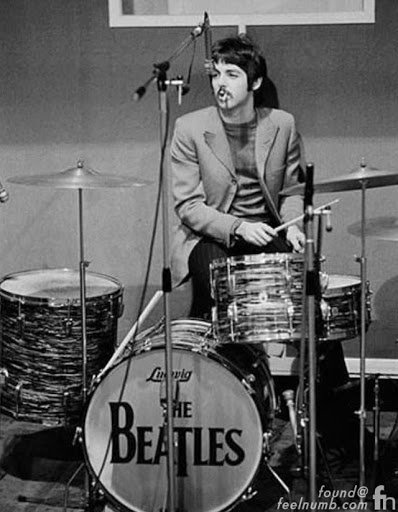
Recording drums

If you’re looking to record your own music, acoustic drums are notoriously difficult. They require a tonne of expensive microphones, stands, cables, acoustic treatment, an interface, software… The list goes on! Don’t forget the space required and noise produced often make it incredibly impractical at home. By contrast, electronic drums can be recorded straight into a computer via USB with no noise for a family or housemates to complain about.
How to effectively learn to play drums
Here’s some great news, if you already play another instrument, you have a huge leg-up over someone who doesn’t, even if your instrument seems unrelated to drumming. The reason being: you already know how to practise an instrument. You’ve gone through this process before!
Suggested reading: Beginners Guide to Learning Electronic Drums
Starting out on the kit can be awkward at first. Many beginners tend to get tangled up in their own limbs as they figure out how to use them independently. The best advice to get through this applies to all drummers at all levels: practice slowly. Speed will come naturally, playing fast without a solid rhythmic and technical foundation is no use to anyone. Slow things right down until you feel completely comfortable and can play the groove without thinking. From there, you’ll be ready to take the tempo up.
Don’t be discouraged if you feel like your brain isn’t connecting to your limbs smoothly in the early stages, this comes naturally over time. Keep in mind that everything that’s ever been played on a drum kit is simply a combination of 2 hands and 2 feet. Any able-bodied person already has the same tools as the best drummers in the world!
Bringing it back to basics
While learning to drum in the early stages, play close attention to proper technique. It can help to spend some time with a teacher to get you set up. Maybe a few lessons from your drummer in exchange for a case of beer? Lessons are essential to prevent you from reinforcing bad habits through repetition. This is a sure-fire way to give yourself carpal tunnel and repetitive strain injury (RSI) down the track. Not only will this leave you unable to play for some time, it can also be painful.
With that in mind, don’t underestimate the importance of warming up before diving into any intense playing. Drummers learn and practise rudiments, basically the drum equivalent to playing scales. While not exactly sexy, they’re an important part of developing proper control over the sticks and can be applied around the kit for more exiting playing once you’re comfortable with the basics.
Suggested Video – V-Drums lesson – Rudiments
Melodics
Using apps like Melodics are great ways to add structure to your practise and ensure you’re progressing. Melodics will be familiar to anyone who used to play guitar hero (or still plays it – no judgements!) in that it guides you on what to play in an easy to follow, visual layout and gives you real-time feedback on your timing.
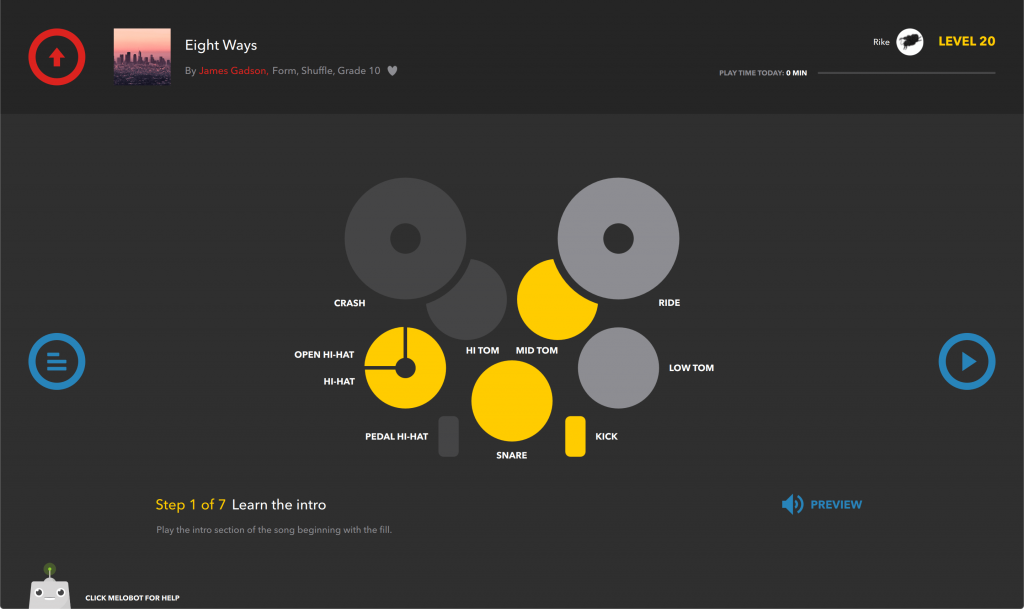
Melodics say it best on their website: “Practising to a metronome will tighten your timing, but can be boring. Playing along to tracks is fun, but it can be hard to tell how you’re progressing.” Melodics essentially takes care of both needs in the one app.
Choosing the right kit to learn on
When it comes to choosing a kit to learn on, its important to strike a balance between something that is professional quality and will last a long time but won’t break the bank.
Of course, there are pros and cons to both acoustic and electronic drums which could be debated until the cows come home. Keep in mind your particular needs though. If you want to learn to play while being able to record ideas and use coaching apps, without a dedicated space and the blessing of people you live with, electronic could be the way to go!
Here are a few suggestions from the V-Drums range:
TD1-DMK
Saying that the TD-1 DMK punches above its weight is an understatement. It has the essence of V-Drums in a lightweight body that can be easily folded up and stash away. The module is streamlined and has a tonne of great sounds ranging across genres for great flexibility.
TD-17 Range
For those looking for a little step up without getting into professional territory, the TD-17 range is a perfect choice. It features Bluetooth connectivity and has more options for customisation, allowing you to add additional cymbals and pads.
Conclusion
No matter what instrument you know best, or the genre you play, learning to drum will undoubtedly improve your musicianship. Since you’ve already put in the hard yards learning another instrument, you can focus on having fun! All you need is a kit and a set of sticks.

